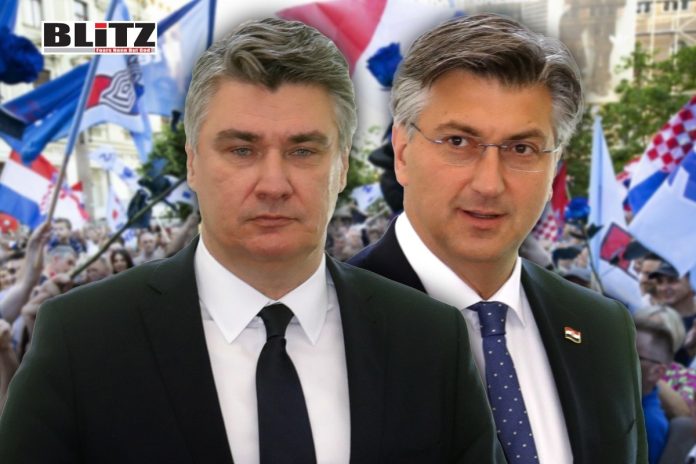Croatia finds itself at a pivotal crossroads as voters across the nation cast their ballots in a highly anticipated parliamentary election. The campaign leading up to this moment has been marked by intense rivalry and bitter exchanges between Prime Minister Andrej Plenkovic and President Zoran Milanovic. Amidst a backdrop of pressing challenges, including corruption, labour shortages, soaring inflation rates, and illegal migration, the future direction of Croatia hangs in the balance.
Prime Minister Plenkovic, leading the conservative Croatian Democratic Union (HDZ), initially seemed to be on a smooth path towards securing a third consecutive term in office. His party’s longstanding dominance in Croatian politics gave the impression of an assured victory. However, the political landscape shifted dramatically in mid-March when President Milanovic, representing the left-wing Social Democrats (SDP), threw his hat into the ring, announcing his candidacy for prime minister.
Milanovic’s decision to challenge Plenkovic was unexpected but not entirely surprising given his reputation for challenging the status quo. Despite the largely ceremonial nature of his presidential role, Milanovic has been an outspoken critic of Plenkovic’s government. In his impassioned final address before the election, Milanovic didn’t mince words, describing the current administration as “the most corrupt government” in Croatia’s history. He rallied citizens, urging them to use their vote as a tool to “reject HDZ” and framing the election as a “referendum on the country’s future.”
Corruption has been a recurring theme throughout Milanovic’s campaign against the HDZ. He didn’t hesitate to label Plenkovic as the “godfather of crime,” pointing to questionable appointments, including the recent selection of a chief prosecutor allegedly linked to corruption scandals. This focus on corruption resonated with many Croatians, given the HDZ’s history of corruption allegations and ministerial resignations.
Despite facing a court ruling that stipulated he could only run for prime minister if he resigned from his presidential position, Milanovic pressed on with his campaign across the country. Plenkovic seized this opportunity to criticize Milanovic, accusing him of flouting the constitution and resorting to hate speech. The prime minister went as far as to call Milanovic a “coward” for not adhering to the rule of law and stepping down as president.
In contrast, Plenkovic sought to highlight his government’s achievements during his tenure since 2016. He pointed to Croatia’s successful accession to the eurozone and its inclusion in Europe’s passport-free Schengen area as significant milestones. However, despite these advancements, economic disparities remain, with Croatia grappling with being one of the EU’s economically disadvantaged nations, as evidenced by an average monthly wage of €1,240 ($1,345).
The campaign also exposed deep divisions between the two leaders on foreign policy, notably concerning the Ukraine-Russia conflict. Plenkovic criticized Milanovic’s opposition to EU support for Ukraine and his reluctance to allow the training of Ukrainian soldiers on Croatian soil. “Milanovic is pushing Croatia and its people towards the Russian world,” Plenkovic asserted at a campaign rally.
Milanovic defended his stance, arguing that he was prioritizing Croatia’s interests and aiming to prevent the nation from being “dragged into war.” Milanovic’s active involvement in the campaign injected new energy into the SDP, bolstering its popularity. Despite this, no single party is projected to secure an outright majority in the 151-seat assembly. Current polls suggest HDZ leading with approximately 30% of the vote, followed by SDP at 20%, and the nationalist right-wing Homeland Movement in third place.
The HDZ’s longstanding dominance in Croatian politics dates back to the country’s independence from Yugoslavia in 1991. In contrast, the SDP has traditionally served as the main opposition force. Milanovic, with his previous experience as prime minister from 2011 to 2016, is known for his fiery rhetoric and confrontational style, often targeting HDZ opponents, EU officials, and critics alike.
As the dust settles after the election, Milanovic’s presidential term is set to expire in January. He has indicated a willingness to step down should the SDP and its coalition partners secure a majority to form a new government.
Polling stations opened their doors at 0500 GMT and will remain operational for 12 hours, allowing Croatians ample time to make their voices heard. As voters navigate the complexities of this election, the outcome will undoubtedly shape Croatia’s political trajectory and future. The intensity of the political rivalry between Plenkovic and Milanovic has captivated the nation, emphasizing the critical importance of this election for Croatia’s democratic institutions and the well-being of its citizens.




